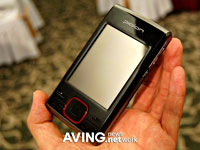 No relation to the fabulous football team known as the Bluebirds, the Korean electronics company Blue Bird have announced their shiny new BM-300 T-DMB Personal Digital Assistant (PDA).
No relation to the fabulous football team known as the Bluebirds, the Korean electronics company Blue Bird have announced their shiny new BM-300 T-DMB Personal Digital Assistant (PDA).
A slim and sleek affair, the PDA is kitted out in an all-black finish with a red strip running around the traditional 5-way D-controller.
Running on Windows Mobile 5.0, the big news for this PDA is its support for T-DMB – that’s Terrestrial Digital Multimedia Broadcasting donchaknow – which lets perambulating punters tune into digital TV when they’re out and about.
 Although the 2.8 inch touchscreen TFT-LCD (QVGA) display looks like a bit of a whopper, it can only support a miserly 240 x 320 pixel resolution -a bit of a disappointment for a PDA and hardly likely to enhance the TV watching experience,
Although the 2.8 inch touchscreen TFT-LCD (QVGA) display looks like a bit of a whopper, it can only support a miserly 240 x 320 pixel resolution -a bit of a disappointment for a PDA and hardly likely to enhance the TV watching experience,
Looking inside the gubbins of the unit, we can see that the BM-330 is powered by a nippy Intel Bulverde CPU, purring along at 520 MHz with 64MB RAM and 128MB ROM onboard memory.
 Memory can be further expanded via an SD SDIO card slot.
Memory can be further expanded via an SD SDIO card slot.
Although the lack of a built in phone has seriously piqued our interest, there’s still a few connectivity options on board, with WLAN 802.11b/g, Bluetooth (v1.2 Class2), USB, and – if we’re not mistaken – IR.
The BM-300 is a pretty pocketable affair, measuring up at 110 x 60 x 13.8 (mm) and it’s scheduled to be released in Korea during October 2006, with – as usual – no news on a European/US release or pricing.
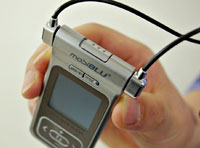 We’re getting very excited by what we’ve seen of mobiBLU’s new ultra, ultra-slim US2 media player.
We’re getting very excited by what we’ve seen of mobiBLU’s new ultra, ultra-slim US2 media player.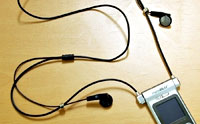 Similarly, we’ve no details about the specifics of the advertised “Audio, Video, Photo support,” but we can guess that it plays back MPEG4 files and can display JPEGs.
Similarly, we’ve no details about the specifics of the advertised “Audio, Video, Photo support,” but we can guess that it plays back MPEG4 files and can display JPEGs. Ofcom has just issued guidance that GPS repeaters are probably illegal in the UK, both in their use and their sale.
Ofcom has just issued guidance that GPS repeaters are probably illegal in the UK, both in their use and their sale. GPS devices need to be able to receive the positional information from satellites. Initially this involved having line-of-sight to the ‘birds’, but as chip-sets have improved, they’ve become more sensitive, so requiring less direct sight. If GPS units work within buildings, they do so at the sacrifice of accuracy. Even with the chip improvements, GPS will not work within buildings, and certainly not underground.
GPS devices need to be able to receive the positional information from satellites. Initially this involved having line-of-sight to the ‘birds’, but as chip-sets have improved, they’ve become more sensitive, so requiring less direct sight. If GPS units work within buildings, they do so at the sacrifice of accuracy. Even with the chip improvements, GPS will not work within buildings, and certainly not underground. If you’re finding the relentless march of technology to be a little too pacey for your liking, perhaps you might like to seek solace with some reassuringly retro handset attachments for your mobile phone and home PC.
If you’re finding the relentless march of technology to be a little too pacey for your liking, perhaps you might like to seek solace with some reassuringly retro handset attachments for your mobile phone and home PC. We know they look daft, but let’s be honest – do they look any sillier than a Bluetooth earpiece stuck on your lughole?
We know they look daft, but let’s be honest – do they look any sillier than a Bluetooth earpiece stuck on your lughole? Hulger now offer a range of five retro handsets, two of which come with a cordless Bluetooth configuration.
Hulger now offer a range of five retro handsets, two of which come with a cordless Bluetooth configuration.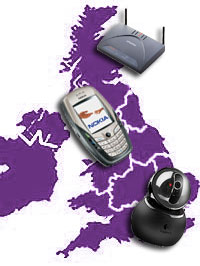 Brits are going wild for the latest technological innovations according to market research firm GfK in its biannual ‘UK Technology Barometer report.’
Brits are going wild for the latest technological innovations according to market research firm GfK in its biannual ‘UK Technology Barometer report.’ Not surprisingly, smartphones continue to set the cash tills ringing with a big increase in sales, while single-function PDAs are carrying on their slow decline, with sales slumping by 38.3%.
Not surprisingly, smartphones continue to set the cash tills ringing with a big increase in sales, while single-function PDAs are carrying on their slow decline, with sales slumping by 38.3%. Samsung has released the details of their new digital camera range, Samsung NV – New Vision.
Samsung has released the details of their new digital camera range, Samsung NV – New Vision.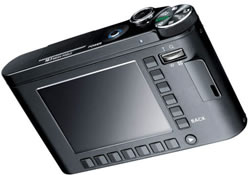 The NV3 is the one that we think will get you most excited dear reader. It’s not only a camera, but an mp3 player and PMP, so it can play films too. It’s equipped with stereo speakers, so you can share you tunes too.
The NV3 is the one that we think will get you most excited dear reader. It’s not only a camera, but an mp3 player and PMP, so it can play films too. It’s equipped with stereo speakers, so you can share you tunes too. Korean technology company KTF Technologies have unveiled a teensy-weensy phone, which is “smaller then a lipstick.”
Korean technology company KTF Technologies have unveiled a teensy-weensy phone, which is “smaller then a lipstick.” KTF Technologies, are the handset-making subsidiary of Korea’s second biggest wireless carrier, KTF, and the company has said that it intends to market the mini-sized slider, EV-K130 from this week, priced at around 370,000 won (approx £210, €305).
KTF Technologies, are the handset-making subsidiary of Korea’s second biggest wireless carrier, KTF, and the company has said that it intends to market the mini-sized slider, EV-K130 from this week, priced at around 370,000 won (approx £210, €305). Last week the French legislature approved a new law which could radically change the landscape of digital audio. The so-called ‘iTunes Law’ is designed to break the control hardware manufacturers exert over the type of content that can be played by their digital music players and software. The result would be that companies such as Apple, Microsoft and Napster would have to make their data formats interoperable, thereby opening their systems to music from rivals. A regulatory body could be set up to police the sector.
Last week the French legislature approved a new law which could radically change the landscape of digital audio. The so-called ‘iTunes Law’ is designed to break the control hardware manufacturers exert over the type of content that can be played by their digital music players and software. The result would be that companies such as Apple, Microsoft and Napster would have to make their data formats interoperable, thereby opening their systems to music from rivals. A regulatory body could be set up to police the sector. The iTunes Law does, however, leave a get-out for the tech companies. A newly-added clause permits artists to exercise control over additional DRM. In short, artists could object to their music being transferred into other formats, thereby ensuring that current practices could continue unaffected. This loophole would require renegotiation of existing contracts, something Apple et al may wish to avoid given record companies’ desire to recoup perceived losses due to piracy. Lawyers observed that the new law is complex and its impact will be difficult to judge until it is tested in court.
The iTunes Law does, however, leave a get-out for the tech companies. A newly-added clause permits artists to exercise control over additional DRM. In short, artists could object to their music being transferred into other formats, thereby ensuring that current practices could continue unaffected. This loophole would require renegotiation of existing contracts, something Apple et al may wish to avoid given record companies’ desire to recoup perceived losses due to piracy. Lawyers observed that the new law is complex and its impact will be difficult to judge until it is tested in court. We always thought that computer gaming was the near-exclusive domain of incommunicado male teenagers, but a new study by Parks Associates has found that 59% of all U.S. consumers who play games on a mobile phone are of the lady persuasion.
We always thought that computer gaming was the near-exclusive domain of incommunicado male teenagers, but a new study by Parks Associates has found that 59% of all U.S. consumers who play games on a mobile phone are of the lady persuasion.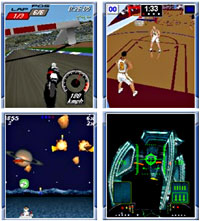 Predictably, the study found that it’s still the men who want to blast aliens, blow up things and take part in role-playing games, while women prefer less frenetic mobile gaming activities, like online trivia and card games.
Predictably, the study found that it’s still the men who want to blast aliens, blow up things and take part in role-playing games, while women prefer less frenetic mobile gaming activities, like online trivia and card games. John Barrett, director of research at Parks Associates reckoned that women are the foundation of the gaming market, adding that, “as an industry, we need to cater to their preferences.”
John Barrett, director of research at Parks Associates reckoned that women are the foundation of the gaming market, adding that, “as an industry, we need to cater to their preferences.” UK British music recording industry trade association, the BPi, has today issued a statement that they have “successfully jumped the first hurdle in its battle to have unauthorised Russian download site AllofMP3.com declared illegal.”
UK British music recording industry trade association, the BPi, has today issued a statement that they have “successfully jumped the first hurdle in its battle to have unauthorised Russian download site AllofMP3.com declared illegal.” The argument of the BPI is that AllofMP3 has no right to be selling the music, as they aren’t licensed to do so. AllofMP3 counter that they are “authorized by the license # LS-3М-05-03 of the Russian Multimedia and Internet Society (ROMS) and license # 006/3M-05 of the Rightholders Federation for Collective Copyright Management of Works Used Interactively (FAIR).”
The argument of the BPI is that AllofMP3 has no right to be selling the music, as they aren’t licensed to do so. AllofMP3 counter that they are “authorized by the license # LS-3М-05-03 of the Russian Multimedia and Internet Society (ROMS) and license # 006/3M-05 of the Rightholders Federation for Collective Copyright Management of Works Used Interactively (FAIR).”